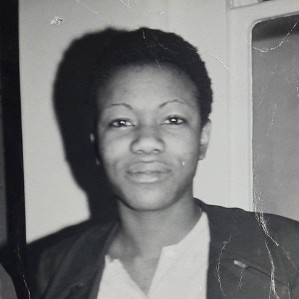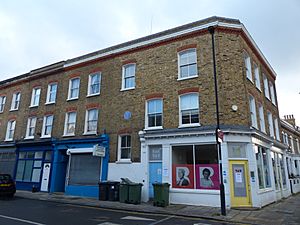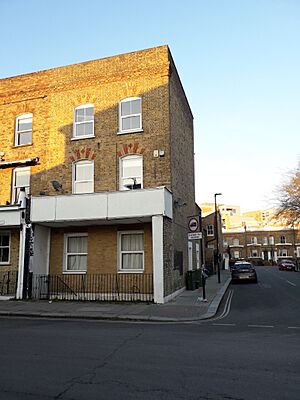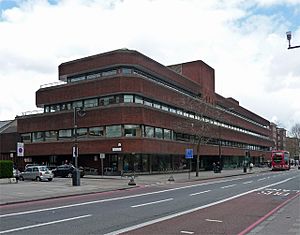Olive Morris facts for kids
Quick facts for kids
Olive Morris
|
|
|---|---|
 |
|
| Born | 26 June 1952 St Catherine, Jamaica
|
| Died | 12 July 1979 (aged 27) Lambeth, London, England
|
| Education |
|
| Occupation | Community leader and activist |
Olive Elaine Morris (26 June 1952 – 12 July 1979) was a remarkable activist born in Jamaica. She became a key leader in Britain, fighting for important causes in the 1970s. Olive championed women's rights, the rights of black people, and fair housing for everyone.
When she was 17, Olive faced unfair treatment from police officers in Brixton, South London. This experience strengthened her resolve to fight for justice. She joined the British Black Panthers and developed strong beliefs about equality for all. Olive also helped create community spaces in empty buildings on Railton Road in Brixton. These spaces became places for learning and activism, like Sabarr Books and the 121 Centre.
Olive was a key organizer in the Black Women's Movement in the United Kingdom. She co-founded important groups like the Brixton Black Women's Group and the Organisation of Women of African and Asian Descent in London. Even when she studied at the Victoria University of Manchester, her activism continued. She was involved in local groups and traveled to China to learn more about community organizing.
After graduating, Olive returned to Brixton and continued her work at a community law center. Sadly, she became ill and passed away at the young age of 27. Her life and work are still remembered and celebrated today. Organizations like Lambeth Council named a building after her, and activist groups continue her legacy. Friends remembered her as brave and dedicated to fighting unfairness. She was even featured on a local currency note and recognized as an inspirational black British woman.
Who Was Olive Morris?
Early Life and Moving to London
Olive Morris was born on 26 June 1952, in Harewood, St Catherine, Jamaica. Her parents were Vincent Nathaniel Morris and Doris Lowena. She had five brothers and sisters.
When her parents moved to England, Olive first lived with her grandmother. At nine years old, she joined her parents in South London. Her father worked as a forklift driver, and her mother worked in factories. Olive attended several schools in London. She later went back to study and attended college.
Becoming an Activist
In the late 1960s and early 1970s, black British activists discussed important ideas. They focused on identity, fairness, and how countries treated each other. Their main goals were to find their identity and help their communities. They also supported others facing similar challenges.
Even after new laws were passed, black people in the UK still faced racism. It was harder for them to find homes and jobs. Black communities also faced pressure from the police and certain groups. To fight these problems, black Britons challenged unfair systems. They celebrated African cultures, inspired by movements fighting for freedom. They also expressed themselves through their clothing and hairstyles, showing their pride. They listened to music from the Caribbean and the United States. They displayed images of famous revolutionary figures like Angela Davis.
Olive was drawn to this movement. It allowed her to celebrate her Caribbean roots and black identity. It also gave her a way to fight against problems affecting her community. Olive was just over five feet tall, but she was known as a fierce activist. Other activists described her as fearless and dedicated. She refused to stand by and let injustice happen.
A researcher named Oumou Longley noted that Olive had a rich and varied background. She was born in Jamaica, grew up in Britain, helped create community spaces, and earned a degree. Olive had a unique personal style, often wearing jeans and short hair. Her choices challenged ideas about what it meant to be British or Caribbean. Her style was similar to other activists who used their appearance to make a statement.
Standing Up for Justice
In 1969, a Nigerian diplomat named Clement Gomwalk was stopped by police in Brixton. A crowd gathered, and things became tense. Some accounts say Olive tried to help and was then mistreated by the police herself.
Olive recalled her friend being dragged away by police. He shouted "I've done nothing" as his arm was broken. Olive did not say exactly how she became involved. However, she was arrested and faced rough treatment while in police custody. Because of her short hair and clothing, the police mistakenly thought she was a young man. Her brother Basil said she was badly injured, to the point where he could barely recognize her face. Olive was charged with assaulting a police officer and faced legal consequences. However, she felt these charges were unfair.
This experience deeply affected Olive. It strengthened her belief in fighting for justice and equality for everyone. She understood that different types of unfairness, like racism and sexism, are often connected.
Joining the British Black Panthers
Olive decided to campaign against police harassment. She joined the youth section of the British Black Panthers in the early 1970s. This group was not directly linked to the Black Panther Movement in the United States. However, it shared a focus on improving local communities. The British Panthers promoted Black Power and aimed for unity among African people worldwide.
Olive met other important activists like Altheia Jones-LeCointe and Linton Kwesi Johnson. In 1972, she tried to meet Eldridge Cleaver, a leader of the US movement, in Algeria. She traveled with her friend Liz Obi, but they only made it to Morocco. They ran out of money and had to ask for help to return home.
In the early 1970s, many black activists faced unfair charges in court. The Black Panthers organized protests during the trial of the Mangrove Nine. The accused were eventually found not guilty. The judge even said that some police officers showed prejudice. During another trial, the Oval Four, Olive was arrested after a scuffle with police. She and two others faced charges. They asked for a jury that included black or working-class people. They also researched the judge's background. They found he had a history of prosecuting people who fought for independence in other countries. When their case went to trial in 1972, the police officers gave conflicting stories. The jury found Olive and the other defendants not guilty.
After the British Black Panthers, Olive helped start the Brixton Black Women's Group in 1973. She founded it with Liz Obi and Beverley Bryan. This group created a safe space for black and Asian women to talk about important issues. It also allowed them to share their experiences. The group felt that some women's rights movements at the time didn't always focus on the specific challenges faced by black women. These challenges included childcare and fair pay for their work. The group worked without a strict leader. It published a newsletter called Speak Out. They also produced a book, The Heart of the Race: Black Women's Lives in Britain, which was published in 1985. This book was dedicated to Olive Morris.
Creating Community Spaces in Brixton
Because many people needed homes, Olive started using empty buildings in Brixton. She saw this as a way to create important community projects. Using these spaces helped the Brixton Black Women's Group work independently. In 1973, Olive and Liz Obi used 121 Railton Road as a community space. When their belongings were removed, Olive and Liz quickly moved back in and reached an agreement. Olive explained to a newspaper that housing prices were too high for many people. A handbook for people seeking housing even featured a photo of Olive on its cover.
The building became a center for activism. It hosted groups like Black People against State Harassment. Sabarr Bookshop was also set up there by local black men and women, including Olive. Through the bookshop, activists worked with schools. They provided reading materials about black history for a more diverse curriculum. Olive and Liz then moved to another community space at 65 Railton Road.
The 121 building later became a community center called the 121 Centre. It was run by the people who used it and stayed open until 1999. A researcher named Faye V. Harrison lived with Olive and her sister in the mid-1970s. She recalled that Olive believed everyone deserved a home. Olive saw using empty buildings as a direct way to help people find shelter. She encouraged others to do the same.

Olive was also involved with the Race Today collective. This group included Farrukh Dhondy and Darcus Howe. When it separated from another organization in 1974, Olive helped it find a base in Brixton's community spaces. The offices were eventually at 165–167 Railton Road. There, the collective produced its magazine and held discussions. The famous writer C. L. R. James lived on the top floor of the building. These offices later became the Brixton Advice Centre.
Activism in Manchester
Olive studied economics and social science at the Victoria University of Manchester from 1975 to 1978. She quickly joined local political groups in Moss Side. She co-founded the Black Women's Mutual Aid Group. She also met local activists like Kath Locke. Locke had started the Manchester Black Women's Co-operative (MBWC) in 1975. Olive got involved, and members remembered her energy. She also spoke out against the university's plans to raise fees for students from other countries. After her death, the MBWC later changed its name to the Abasindi Women's Co-operative. From its base, Abasindi organized educational and cultural activities without needing government money.
Olive helped establish a supplementary school. She campaigned with local black parents for better education for their children. She also helped create a black bookshop. With her global perspective, she participated in a national committee for overseas students. She traveled to Italy and Northern Ireland. In 1977, she traveled to China. She wrote an article called "A Sister's Visit to China" for the Brixton Black Women's Group newsletter. The article discussed community organizing and how people in China were working against unfair global power.
Returning to Brixton and New Groups
After graduating in 1978, Olive returned to Brixton. She worked at the Brixton Community Law Centre. With her partner Mike McColgan, she wrote a pamphlet. It discussed how to best fight racism, including racism within institutions. With educators Beverley Bryan and Stella Dadzie, plus other women, Olive helped set up the Organisation of Women of African and Asian Descent (OWAAD) in London. It held its first conference at the Abeng Centre in Brixton, which Olive had helped to found. Bryan later remembered Olive as a "strong personality."
At the conference, hundreds of African, Asian, and Caribbean women from across the UK met. They talked about important issues like housing, jobs, health, and education. OWAAD wanted to connect different groups and empower women. It also aimed to fight against racism, sexism, and all forms of unfairness. Alongside the Brixton Black Women's Group, OWAAD was one of the first organizations for black women in the United Kingdom. Olive edited FOWAD!, the group's newsletter, which continued to publish after her death.
Her Last Years
In 1978, Olive became ill during a cycling trip in Spain. After returning to London, she was diagnosed with a serious illness called non-Hodgkin lymphoma. Sadly, the treatment was not successful. She passed away on 12 July 1979, at just 27 years old. Her grave is at Streatham Vale Cemetery.
Remembering Olive Morris
Olive Morris played a very important part in creating a Black Power movement for women in the UK. A researcher named Tracy Fisher said her contributions were incredibly important. The Brixton Black Women's Group published an article in their newsletter. It praised Olive for her strong dedication to fighting for freedom, fairness, and a better society. In 1980, the poet Linton Kwesi Johnson published a poem in her memory.
Buildings and Memorials
In 1986, Lambeth Council named a new building at 18 Brixton Hill after her. This happened thanks to a campaign by the Brixton Black Women's Group. The local housing office was based there. Olive had protested outside that office for better housing rights. The building was named after her following community events in Brixton. It was later taken down in 2020. A playground in Myatt's Fields was also named after Olive Morris.
In October 2024, Olive Morris was honored with an English Heritage blue plaque. It was unveiled at 121 Railton Road, marking a place important to her activism.
Awards and Archives
In 2000, Liz Obi organized an exhibition about Olive Morris at Brixton Library. In 2007, Ana Laura López de la Torre started a blog to remember Olive's legacy. The following year, the Remembering Olive Collective (ROC) was launched. It included members like Tanisha C. Ford and Liz Obi. This group celebrated Olive's life. It collected information about her life and showed how her experiences fit into the wider history of black people in Brixton. A booklet called Do You Remember Olive Morris? was published in 2010 and shared with local schools.
ROC started the Olive Morris Memorial Awards in 2011. These awards offer financial support to women of African or Asian descent aged 16 to 27. In 2019, the collective was re-launched as ROC 2.0. This happened because the building named after Olive was going to be demolished. The group wanted to make sure her memory lived on.
Researchers like Tanisha C. Ford see ROC as a group led by local historians. These historians often create important projects like the Black Cultural Archives. Ana Laura López de la Torre and Liz Obi gathered many materials. They created the Olive Morris Collection at the Lambeth Archives. The archives were at the Minet Library. In 2020, it was announced they would move to a new Olive Morris House. This new building was constructed where the old one stood.
Art and Media
Olive Morris is featured on the B£1 note of the Brixton Pound. This is a special local currency. In 2017, a mural called "SAY IT LOUD" was painted in Brixton. It honored Olive Morris. In 2018, to celebrate 100 years since most women gained the right to vote in the UK, The Voice newspaper listed eight black women who helped develop Britain. Olive Morris was on this list. The Evening Standard also included Olive on a list of 14 "Inspirational Black British Women Throughout History."
Olive was recognized with a Google Doodle in the UK on 26 June 2020. This marked what would have been her 68th birthday. The 2023 short film The Ballad of Olive Morris was nominated for a BAFTA award. It told the story of Olive's life and activism.
In 2021, Olive Morris Court opened in Tottenham. This project provided homes for people who were experiencing homelessness.
See also
 In Spanish: Olive Morris para niños
In Spanish: Olive Morris para niños
 | George Robert Carruthers |
 | Patricia Bath |
 | Jan Ernst Matzeliger |
 | Alexander Miles |



